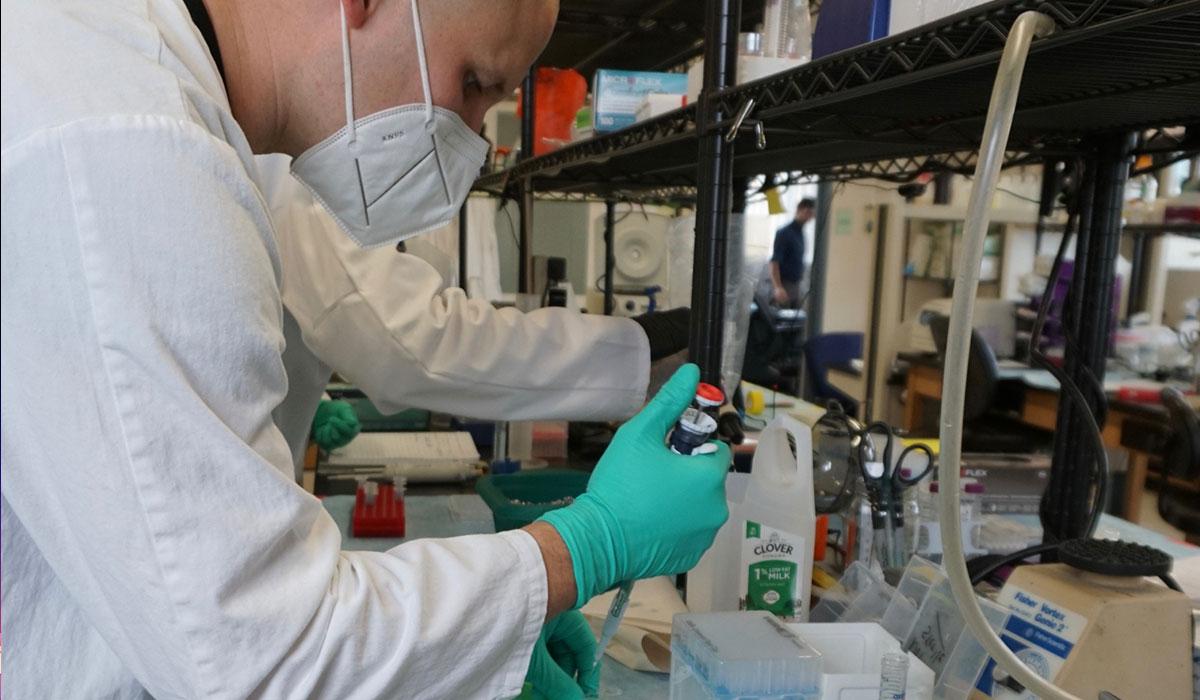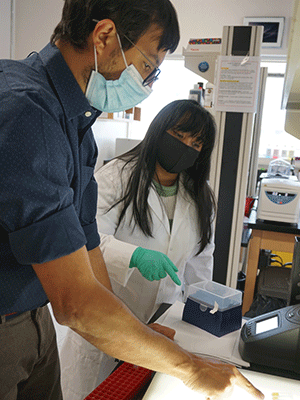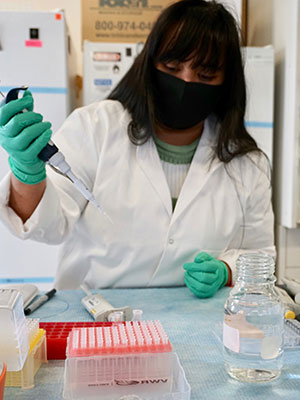
Mary Andres is in her second semester at TMCC; she’s working toward an Associate of Science degree that will enable her to transfer to UNR where she plans to pursue a bachelor’s degree in psychology, with the goal of one day attending medical school to become a practicing psychiatrist. Yet, her journey at TMCC began last year in the Summer Bridge program, which connected her with several academic opportunities. One, in particular, appealed to her above the rest: a Research Immersion Internship Program offered through the Desert Research Institute (DRI).
The 16-week paid program pairs students with researchers working on specific projects. After an initial training period, students work with mentors–DRI researchers–on science, technology and entrepreneurship projects. Three TMCC students, Andres among them, participated in the pilot program of the research internship in 2021.

DRI faculty mentor Riccardo Panella, Ph.D., (left) of the Center for Genomic Medicine and Truckee Meadows Community College student Mary Andres (right) use a bright light to view a sample in Panella’s laboratory in Reno.
Andres was paired with DRI faculty Riccardo Panella who was working on a research project that studied the health challenges of obesity by examining the lipid profiles and liver enzymes in mice. “When I actually got to DRI, they explained that we were working on this new, cutting-edge technology about how basically to reverse obesity through RNA-based treatments,” Andres explained. “I realized...wow, this is actually really cool.”
When she began her internship, Andres hadn’t yet taken a college-level science course. However, as a result of her work with her research mentor, she was learning about how a particular kind of microRNA not only targets the body’s tumor suppressors, but that also impacts metabolism. Under her mentor’s guidance, Andres tested the HDL and LDL levels that were collected from mice used in the research. The study used five different groups of mice to study the effects of the microRNA. The results were not at all what Andres was expecting.
“So, I asked my mentor: ‘...why would you take this medicine if you could just go on a diet and lose weight anyway?’ He told me that people don’t really want to go on a diet, they still want to have their McDonald’s no matter how much they might want to lose weight, so medication like this could really help people,” she said. “Plus, [the results of our research indicated that this] was much more effective for weight loss than just going on a diet.”
Undergraduate Research: What Can You Gain?
Opportunities for undergraduate students at TMCC to conduct research isn't exactly new. For several years, the Summer Bridge Program (of which Andres was a part) has introduced high school students to opportunities through research in Biology. More recently, however, research has been cropping up in all sorts of unexpected disciplines with focuses as varied as the imagination can create. It’s no wonder then, that this year TMCC will be offering a venue for students, no matter in what discipline, to show off their research prowess.
The TMCC Undergraduate Research Showcase happens on Thursday, March 10 in the Student Center on the Dandini Campus. The event will showcase student-created posters detailing individual and group research projects in biology, anthropology, mathematics, and more, which will be on display all day.
In addition to showcasing student work, the Undergraduate Research Showcase will also feature myriad research opportunities for curious students wanting to know more about research opportunities like the DRI Research Immersion Internship Program. Some will be for credit and others, like DRI’s opportunity, are paid. No matter how your hours are awarded, though, chances are you will find value in time spent working in STEM fields, practicing hands-on research methods.
According to Meghan Collins, Education Program Manager at DRI, these kinds of experiences can help students to find career paths that may not have been obvious to them at first, but that could provide enriching and rewarding pursuits. “The Research Immersion Internship is specifically designed to be a stepping stone. DRI provides the perfect setting for that. And really, there are two goals for our program: to provide that career discovery experience so people can make informed choices about their careers. The second goal is that we want to broaden participation and to create a thriving STEM ecosystem with not only science majors, but communications majors, business majors and others who feel comfortable working with science,” she said.
Students who are in their first or second year at a community or state college, no matter their major, can apply for the 120-hour, paid internship. The only requirements are that you have an interest in some aspect of science and that your schedule allows for eight hours of internship work per week during the semester. There are only fifteen spaces available for the 2022 cohort. If selected, a student will work on a project team under the oversight of a mentor, in a group no larger than four.
Adine Stormoen, Northern Nevada Associate Director of Outreach for Nevada INBRE, said that opportunities to perform undergraduate research, like the undergraduate research experiences available through Nevada INBRE and the DRI Immersion Internship, can make a big difference to a student’s career, regardless of their major. “Exposing students to research is so important. Even if a student is an English major, experiencing what research is like can open so many doors. They can start with something like the DRI Immersion Internship and then we can eventually prepare them for more advanced programs and opportunities,” she said. “That’s why events like the TMCC Undergraduate Research Showcase are so important.”
According to last year’s cohort in the DRI Immersion Internship, participating students saw a marked improvement in their STEM literacy and self-efficacy, while feeling supported in their professional and career trajectories. As a result of the internship, students reported an increased ability in solving problems using the tools provided by science and technology, and more confidence in taking the next step in a STEM career. Most importantly, however, they felt comfortable and confident working with scientists in science, technology, engineering and/or math fields.
One participant reported: “After being in this program, I am inspired to keep learning and to keep doing research.”
New Pathways Inspired by STEM
Andres, too, was inspired as a result of her internship with DRI. Her mentor, Panella, encouraged his mentees to maintain an attitude of curiosity... to, as he told his mentees in their first meeting: “...to be confounded.”
“He encouraged us to be in the moment, and if we had questions to just ask them, and that the only stupid question is the one that you don’t ask. That really stuck with me because it is so true,” she said. “If there is advice I would give anyone that I learned from doing this research, it would be not to be embarrassed by asking questions. The sooner you ask, the sooner you’ll be unstuck and the sooner everyone can just move on.”

Andres prepares reagents needed to analyze lipid profiles and hepatic enzymes in a study being conducted by DRI’s Center for Genomic Medicine. The results of these experiments will pave the way for a new generation of RNA-based therapies to treat metabolic disorders and prevent cancer progression.
From a student who was curious about science, Andres is taking bold next steps into her future as a researcher. She extended her internship at DRI, and recently submitted an application to Faculty-led Academic Research Experience (FLARE) through the University of Nevada, Reno. “I just have so much fun learning like this,” she said. “This isn’t information you will find out just by Googling it on the internet. It’s really fun– it’s learning all these new things and how to improve peoples’ lives in general.”
Although the path has been rewarding, it has also been challenging; in addition to her internship at DRI, Andres was taking five three-credit classes from TMCC and volunteering at the TMCC Counseling Center, and these too are experiences that bring meaning to her education and develop into a professional psychiatrist. “It was hard, especially on exam days, and I had to really stay on top of my homework. But honestly, I don’t regret it. It was an enriching experience, and I was getting all this professional experience already before I got out of college. You get to dip your toe into the real world in a way.”
For Andres, there is nothing quite like immersing yourself in research. Unlike taking a class, the elements of discovery and working with the unknown make the work appealing. “The fun part about research is discovering… it just opens up your world way more than never trying it. I think students are missing out on a lot if they don’t even try it once,” she said.
Interested? Stop by the Student Center on Thursday, March 10 to dip your toe into the many opportunities through undergraduate research.
For more information on Undergraduate Research opportunities at TMCC, contact our Undergraduate Research Office.






